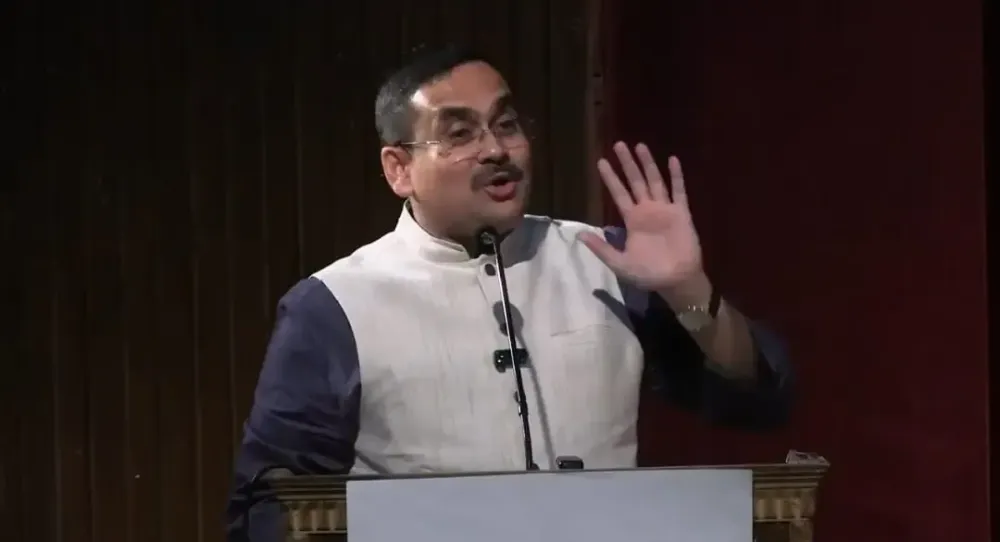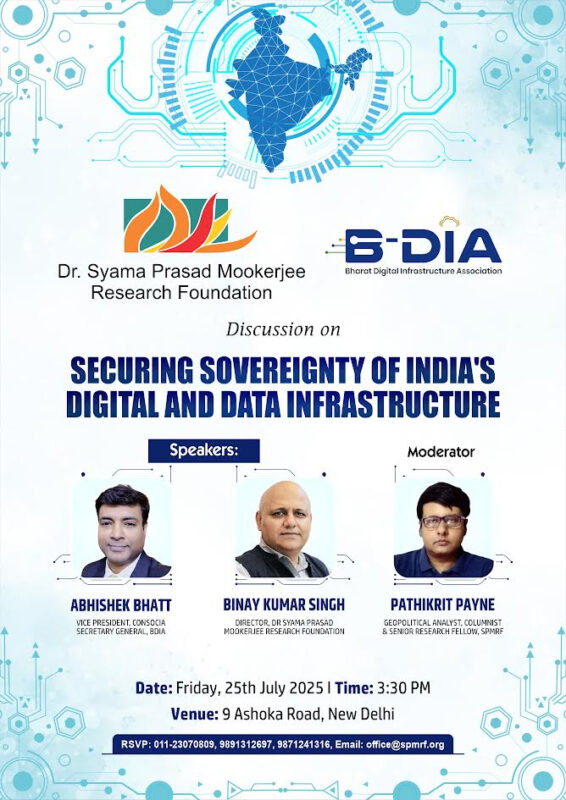Bengaluru, Dec 12 (NationPress) Anirban Ganguly, Chairman of the Dr Syama Prasad Mookerjee Research Foundation in New Delhi, has raised a critical question about the silence of Nobel laureates from West Bengal concerning the ongoing attacks on Hindus and minorities in Bangladesh.
While addressing a session titled ‘A Talk and Discussion on Hindus in Bangladesh, Current Status, Challenges, Way Ahead’ in Bengaluru, organized by the Mantahana Karnataka Organisation, he stated, “Can anyone hear the voices of these laureates? I certainly can’t. There has been no response. Nobel laureate Amartya Sen, who has no qualms about writing to the New York Times on issues regarding democracy in India and the alleged threats to the Constitution, has remained silent over the past hundred days regarding this matter.”
“Prominent figures like Amartya Sen, Amitav Ghosh, and Abhijit Banerjee have refrained from publicly condemning the atrocities occurring in Bangladesh. I have been attentive to their silence. No voice has emerged from these distinguished Bengali Nobel laureates, including those who have advised others, like Mohammad Yunus, the Chief Advisor of Bangladesh’s interim government,” he emphasized.
“While the renowned laureates remain mute, ordinary Bengalis and the Bengali diaspora, along with the Indian community, are voicing their dissent. Prominent cities in Europe, the US, and India have seen a surge of protests in the last 72 hours,” he continued.
“As Hindus in Bangladesh stand firm, the global Indian diaspora is intensifying their protests. It is our responsibility to maintain this momentum and apply pressure, irrespective of whether certain Nobel laureates choose to remain silent,” he asserted.
Ganguly noted that the most severe persecution of Hindus began in 1950. He pointed out, “Approximately 74% of West Pakistan’s exports relied on materials sourced from East Pakistan. Following a devastating cyclone in October 1970 that claimed 500,000 lives, West Pakistan showed no interest in providing relief.”
He further elaborated, “In 1971, the Pakistan army executed a large-scale genocide, targeting intellectuals and students, committing widespread atrocities against women, and utterly dismantling the educational and social framework of East Pakistan, resulting in a significant exodus of Hindus to India.”
“It is profoundly ironic that despite this history, the current leadership in Bangladesh perceives Pakistan as their closest ally. Recently, memorials commemorating the Indian army’s role in liberating Bangladesh have been destroyed, a development unprecedented in history. Radical ideologies are gaining ground in universities, with the Jamaat party exerting control. The advisor has kept the situation ambiguous regarding current events in Bangladesh,” Ganguly remarked.
“The regulations in Bangladesh are anti-India, and there are intentions to sever the northeast from India. Except for Kailash Satyarthi, no other Nobel laureate has spoken out against the violence aimed at Hindus. This time, Sufi Dargahs have also been vandalized, marking a new low. Terrorists have been deliberately released,” he warned.
“This is an unprecedented situation. There exists a collective ideology within the country that seeks to erase the memory of what is transpiring in Bangladesh today, akin to the historical amnesia surrounding the Partition of West Bengal and the plight of Bengali Hindus who became refugees and struggled to live with dignity. The vanishing population of Hindus has been largely ignored,” Ganguly lamented.
“In 1947-48, the Hindu population in East Pakistan was roughly 30%, but according to the 2022 census, it has plummeted to 7.95%. Where has this population disappeared? This is a topic no one wants to discuss,” he stated.
He expressed concern over the calls to ban ISKCON in Bangladesh, branding it as a terrorist organization. This move aims to undermine Hindu minorities, as these centers serve as congregational points for Hindus, he highlighted.
“The Communists and Congress are avoiding these discussions, believing that the situation in Bangladesh will resolve itself. This is a misconception. We witness Hindu resistance in Bangladesh, while the nation grapples with its most severe crisis since the assassination of Sheikh Mujib in 1975,” he pointed out.
For the first time in 70 years, despite the ongoing onslaught, approximately 70 to 72% of Hindus in Bangladesh are organized and resisting, as their crematoriums are being occupied, Ganguly noted.
“There are forces at work aiming for a minority-free Bangladesh, and the minorities are standing up against this. The future actions of the army remain uncertain,” he added.
Bangladesh also boasts a considerable population of Buddhists, with a rich heritage. Buddhist monks have declined to perform significant rituals, symbolizing the resumption of activities following the monsoon break, a sacred tradition they could not undertake, he reported.
“Those who believe the situations of minorities in Bangladesh and India are analogous fail to recognize that Buddhists are currently being hunted and persecuted in Bangladesh as we speak,” he stated.
Meanwhile, in India, Pali has been granted official language status, and Prime Minister Narendra Modi has stated that the Asian century cannot be envisioned without Buddha. He plays a vital role in preserving Buddha’s legacy and has initiated the revival of Nalanda University, which was destroyed by Islamic invaders in the 12th century, Ganguly emphasized.
“To illustrate the situation, let’s consider some statistics. The largest minority in Bangladesh is the Hindus, followed by Buddhists and Christians. Among the 64 districts in Bangladesh, between August 5 and 20, when the violence escalated, 48 to 52 districts witnessed attacks on minorities. Over 2,010 incidents of violence against minorities, including vandalism, killings, and injuries, were reported,” he shared.
The Bangladesh Christian Association released a report detailing attacks on churches across various districts, indicating that Christians were also under threat. Buddhist communities were similarly targeted during the same period, he noted.
“Hindu and Buddhist crematoriums have been occupied, and in areas with significant Buddhist populations like Chittagong, Buddhists have been attacked, resulting in the deaths of 16 Buddhist youths in recent days. Tribal communities have also faced assaults, whereas in India, we honor the contributions of tribal leaders to the freedom movement,” he pointed out.
Countless cases of extortion are reported, and there is a troubling trend of Hindu teachers and academics resigning from institutions. Reports indicate that they have been disrespected, with Indian flags being trampled upon, he shared.
The Vice Chancellors of three major universities were compelled to resign under duress, all of whom were minorities. There has been a mass resignation of 15,000 teachers at various educational levels, with many forced to convert, Ganguly stated.
Hindu officers in the police have faced abrupt dismissals, and the police force, which previously had a significant number of Hindu officers, has seen a drastic reduction. The frequency of Durga pujas has also diminished. In 2021, under the Awami League’s governance, there were assaults on Durga puja celebrations. I observed Islamic extremists gathering during my travels,” he recounted.
The number of pujas in Bangladesh decreased compared to previous years, with numerous instances of pandals being vandalized. Islamists infiltrated Durga Puja celebrations, chanting Islamic songs, despite such activities being forbidden in Islam, he claimed.
59% of the attacks on Hindus were related to their religious practices and properties, including property seizures and desecration of worship sites. 19 Durga puja pandals across 14 districts were vandalized, and in many areas, Hindus were barred from playing music during the Azaan, he pointed out.
Hindu deities were subjected to disrespectful comments and gestures. During protests, it was the protesters who were arrested, not the perpetrators of the desecration of Hindu idols,” he concluded.


